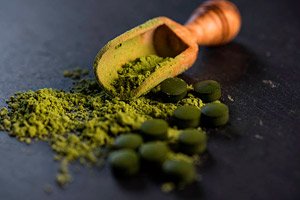
All iLive content is medically reviewed or fact checked to ensure as much factual accuracy as possible.
We have strict sourcing guidelines and only link to reputable media sites, academic research institutions and, whenever possible, medically peer reviewed studies. Note that the numbers in parentheses ([1], [2], etc.) are clickable links to these studies.
If you feel that any of our content is inaccurate, out-of-date, or otherwise questionable, please select it and press Ctrl + Enter.
How can spirulina be a natural remedy for lowering blood pressure?
Last reviewed: 03.08.2025

Learn how adding microalgae like spirulina to your diet can be a natural and sustainable way to manage high blood pressure, especially if you're at risk.
In a recent study published in the Journal of Human Nutrition and Dietetics, researchers examined the effects of edible seaweed on blood pressure (BP). Edible seaweed is an aquatic organism consumed as a supplement or in cooking. It is a traditional part of Asian cuisine, and its consumption has increased significantly worldwide in recent decades. Edible seaweed is available in dried, fresh, or powdered forms, as well as in extracts, functional foods, and supplements.
Bioactive compounds in seaweed may have beneficial effects on cardiovascular health. These include fucoidan, peptides, potassium, antioxidants, omega-3 fatty acids and polyphenols, as well as inorganic nitrate in species such as nori and kelp, which have been linked to potential blood pressure reduction. However, the relationship between hypertension and seaweed consumption remains unclear.
About the study
Spirulina, in particular, reduced systolic blood pressure by more than 5 mm Hg—almost twice as effective as other types of algae studied.
In this study, the researchers looked at the effects of edible seaweed on blood pressure. They searched Scopus, Cochrane, and PubMed. Studies were included that included healthy adults or patients with chronic conditions (metabolic syndrome, hypertension, obesity/overweight, diabetes) with blood pressure reports. Only experimental studies with an intervention duration of at least four weeks were included in the analysis.
After removing duplicates, titles and abstracts were screened and a full text review was performed. Data were extracted: study design, sample size, intervention duration, algae type, participant characteristics, pre- and post-intervention BP values, daily dose, etc. The updated Cochrane tool for randomized trials was used to assess the risk of bias. To account for significant heterogeneity, random-effects models and the inverse variance method were used to determine effect sizes and 95% CIs. Funnel plots were used to assess publication bias. In addition, sub-parietal analyses were performed by algae type, dosage, baseline diastolic (DBP) and systolic (SBP) blood pressure, health status, and intervention duration, as well as a meta-regression analysis of the association between algae dose and BP changes.
Results
The search identified 693 unique studies. After screening and full-text assessment, 29 studies conducted in 12 countries between 2001 and 2022, involving 1583 people aged 18–86 years, were included in the review. Of these, 27 were parallel and 2 were crossover randomized controlled trials. Only 9 studies had a low risk of bias; the rest had issues (errors in randomization, outcome measurements, etc.). Trial duration ranged from 4 to 104 weeks. Eight trials involved healthy adults, the rest involved people with cardiometabolic risks.
A total of 19 studies evaluated microalgae (spirulina, chlorella), and 10 studies evaluated macroalgae (wakame, kombu, etc.). Most studies used algae as supplements; the rest used tablets, drinks, or powder. Twelve studies used whole algae, and 17 used extracts or individual bioactive compounds. Daily doses ranged from 0.001 to 8 g. Baseline SBP was 114–156 mmHg, and DBP was 68–94 mmHg.
Overall, 19 studies found reductions in SBP and DBP with seaweed consumption. The pooled effect showed a significant reduction in SBP by -2.05 mmHg and DBP by -1.87 mmHg, although heterogeneity was high (I² = 75% for SBP; I² = 68% for DBP).
Whole powdered seaweed added to foods (such as salads) has been shown to have a stronger effect than encapsulated supplements in several trials.
Subgroup analyses revealed that the majority of the benefit was attributed to the microalgae (spirulina: SBP –3.43 mmHg; DBP –2.06 mmHg), while macroalgae had no significant effect. Whole algae produced significant reductions in SBP by –3.96 mmHg and DBP by –2.82 mmHg, but extracts/bioactive compounds did not. Spirulina was the most effective microalgae, reducing SBP by –5.28 mmHg and DBP by –3.56 mmHg. Chlorella showed nonsignificant trends (SBP –2.07 mmHg, p = 0.131). At the dose ≥ 3 g/day, DBP was reduced by –3.05 mmHg and SBP by –3.71 mmHg.
Reductions were observed at all durations, but improvements in SBP were significant in short-term (
Meta-regression revealed no association between dose and change in SBP, but baseline SBP was a strong predictor of both SBP and DBP reduction, explaining most of the heterogeneity. No publication bias was detected. Mechanisms were not explored, highlighting a research gap.
Conclusions
In people with metabolic syndrome, the improvement was three times greater than in healthy people, highlighting the targeted benefit.
In conclusion, whole microalgae (especially spirulina ≥ 3 g/day ≥ 12 weeks) are associated with significant reductions in BP, especially in individuals with high blood pressure or cardiometabolic risk. Whole algae outperform extracts, suggesting synergy of bioactive compounds. Baseline SBP is the main predictor of BP reduction.
The authors warn that excessive consumption of seaweed (>5 g/day) may carry risks of heavy metal and iodine accumulation, while microalgae (spirulina) are considered safer. Overall, the results highlight the potential of whole microalgae as a natural and sustainable approach to BP control in addition to existing pharmacological methods.
